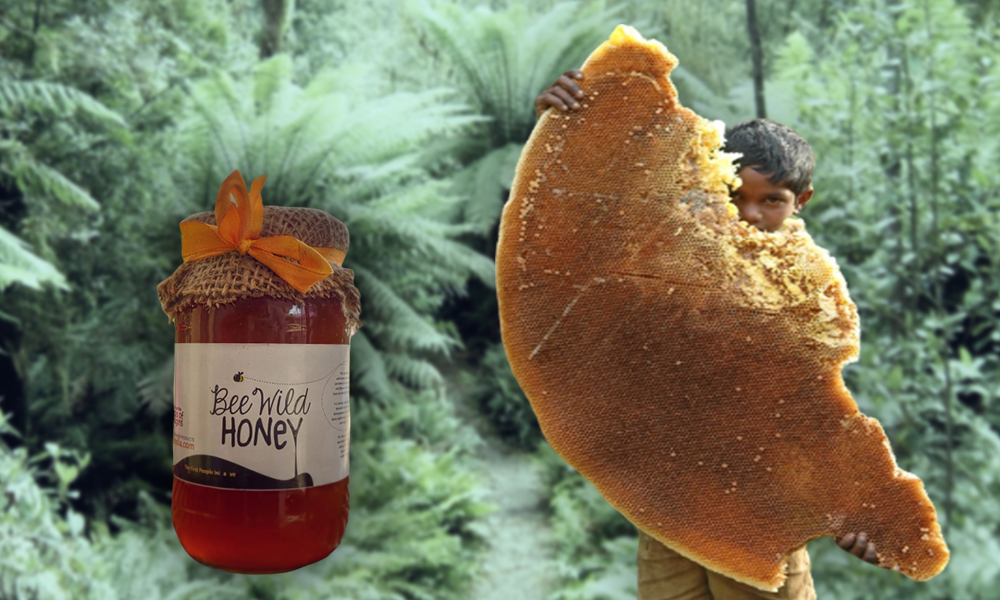
These IIT Delhi Alumni Helped Nilgiri's Kattunayakan Tribe Sell Honey Worth Rs 14 Lakh Amid COVID-19 Crisis
India, 5 Jun 2020 3:38 PM GMT | Updated 6 Jun 2020 7:01 AM GMT
Editor : Prateek Gautam |
A free soul who believes that journalism, apart from politics, should stand for social cause and the environment.
Creatives : Abhishek M
" An engineer by profession, Abhishek is the creative producer of the team, graphic designing is his passion and travelling his get away. In more ways than one, he makes the content visually appealing."
The Kattunayakan are tribals who live deep in the forests of the Nilgiris Biosphere Reserve in South India, and earn a living by collecting and selling wild honey.
The COVID-19 pandemic has brought the lives of thousands of people to a halt. In times as tough as these, Adivasis of the Kattunayakan tribe in Nilgiri have been severely hit.
200 Adivasis of the Kattunayakan tribe formed a collective enterprise years ago to sell their forest honey. But due to the lockdown, 5,000 jars of pure honey were lying unsold. They had no money to support their members.
The Kattunayakan are tribals who live deep in the forests of the Nilgiri Biosphere Reserve in South India. They earn a living by collecting and selling wild honey.
One of the few tribal groups in India to still live as hunter-gatherers, the Kattunayakan live without modern conveniences like indoor plumbing and electricity. The literacy rate is very low among them - both men and women.
Honey plays a crucial role in their lives. They don't just eat honey, but also use it for medicine and trade it for things they need. They often climb tall trees in search of honey. One hive can yield over 25 pounds of honey. Without their honey being sold, they could starve.
Amid the COVID-19 lockdown, about 67% of India's vulnerable population lost their jobs, and there was a 63% dip in earnings, revealed a survey. 74% have started eating less than before to cut costs, and 61% households did not have enough money to buy a week's ration.
The survey was conducted from April 13 to May 9 by Azim Premji University's Centre for Sustainable Development (CSE). It included 3,970 people in urban and rural pockets in 12 states, carried through civil society organizations.
In a bid to solve this crisis, Leap Club (an IIT Delhi alumni-led startup) started a joint campaign along with Just Change India to mobilize consumers across the country to pre-order honey from the tribe.
The last few weeks have been an incredible journey for them. More than 700 people across the length and breadth of the country have contributed to this campaign amassing around 14 lakh rupees in three weeks.
Leap Club is an online marketplace that helps consumers buy products directly from local organic collectives and farmers. They focus on food products and everyday essentials like flours, pulses, fruits and vegetables that are healthy, pesticide-free and sustainable.
It was co-founded by Shubham Bansal and Divish Gupta, two IIT-Delhi alumni, to promote mindful consumption and connect conscious consumers and producers.
Shubham (left), Divish (right)
"We had been in touch with Anil and Stan from Just Change India who work with Adivasi honey gatherers of Nilgiris. We learnt from them that their Adivasi community enterprise was facing a severe cash crunch. They had 5000 jars of honey left unsold because of the lockdown and immediate cash was needed," Shubham, 28, tells The Logical Indian.
"In absence of this, they would either have to borrow from middlemen at exploitative terms which means they risked falling in the debt trap or sell their honey at whatever prices traders were willing to buy from. All the progress made over the years by the Adivasis with the help of Just Change would be lost and the cycle of exploitation would start all over again," he added.
Divish and Shubham had started Leap Club with the aim of building a curated platform for ethical and earth friendly products. They knew that this initiative would help consumers make value driven buying choices and support ethical and sustainable enterprises.
"We thought we could intervene by giving consumers the power to create impact through their buying choices. The idea was simple - people buy their honey now and agree to get it delivered after the lockdown. This would give the Adivasis the funds they need to keep their enterprise running while letting consumers enjoy the taste of unadulterated forest honey," Shubham says.
Divish says that once they started the campaign, they have received a heartwarming response from people across the country.
"People shared about us with their friends and family on WhatsApp and the message really went viral. It truly became a collective movement," Divish, 28, says.
"The funds collected have allowed the Advisasis to sustain their community enterprise and livelihoods of 200 Adivasis has been saved. We frankly didn't expect that so many people would come forward to support the initiative. All of us feel deep gratitude towards everyone who bought the honey and helped us reach out to more people. It has also given us belief that we can possibly do more in the future," he adds.
In a message to the common people, Shubham says: "Because of the lockdown, lots of producers, small businesses, farmers and farmers cooperatives have been facing the problem of cash crunch as they are not able to access the market and sell their products. Lockdown and the covid crisis have put them in a very vulnerable situation."
"But we, as consumers, have the power to support them with our purchasing choices. We need to make buying choices that support communities who need our money the most," says Divish.
Every act of buying can create a positive impact. It has never been more important than now to consume responsibly.
 All section
All section














